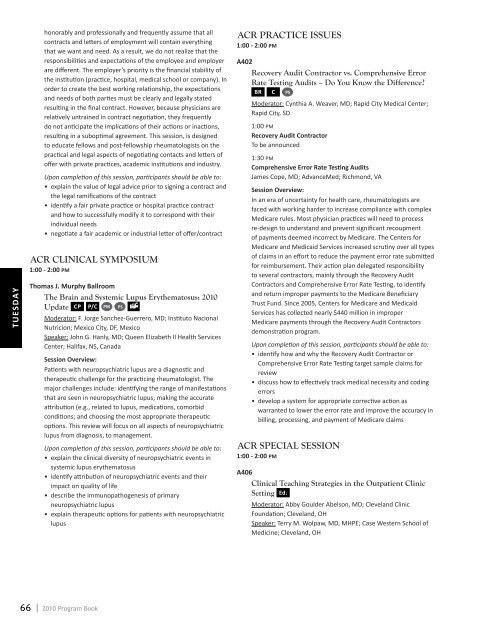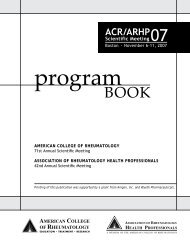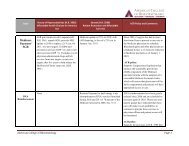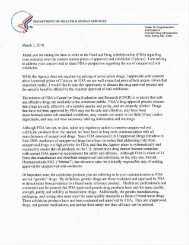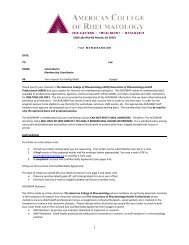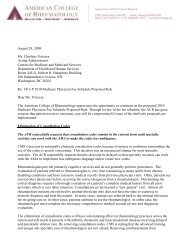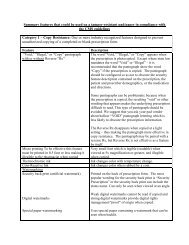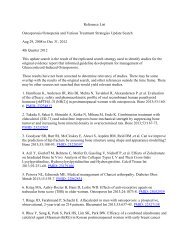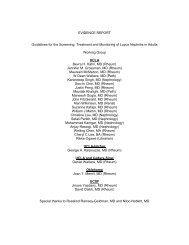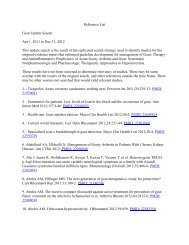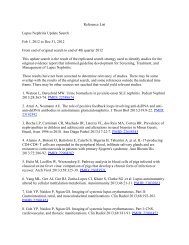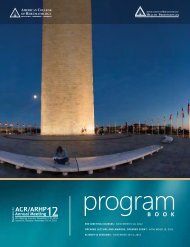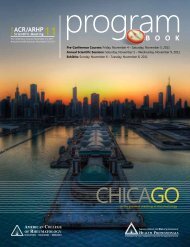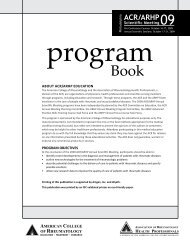B O O K - American College of Rheumatology
B O O K - American College of Rheumatology
B O O K - American College of Rheumatology
Create successful ePaper yourself
Turn your PDF publications into a flip-book with our unique Google optimized e-Paper software.
tuesday<br />
honorably and pr<strong>of</strong>essionally and frequently assume that all<br />
contracts and letters <strong>of</strong> employment will contain everything<br />
that we want and need. As a result, we do not realize that the<br />
responsibilities and expectations <strong>of</strong> the employee and employer<br />
are different. The employer’s priority is the financial stability <strong>of</strong><br />
the institution (practice, hospital, medical school or company). In<br />
order to create the best working relationship, the expectations<br />
and needs <strong>of</strong> both parties must be clearly and legally stated<br />
resulting in the final contract. However, because physicians are<br />
relatively untrained in contract negotiation, they frequently<br />
do not anticipate the implications <strong>of</strong> their actions or inactions,<br />
resulting in a suboptimal agreement. This session, is designed<br />
to educate fellows and post-fellowship rheumatologists on the<br />
practical and legal aspects <strong>of</strong> negotiating contacts and letters <strong>of</strong><br />
<strong>of</strong>fer with private practices, academic institutions and industry.<br />
Upon completion <strong>of</strong> this session, participants should be able to:<br />
• explain the value <strong>of</strong> legal advice prior to signing a contract and<br />
the legal ramifications <strong>of</strong> the contract<br />
• identify a fair private practice or hospital practice contract<br />
and how to successfully modify it to correspond with their<br />
individual needs<br />
• negotiate a fair academic or industrial letter <strong>of</strong> <strong>of</strong>fer/contract<br />
ACR Clinical Symposium<br />
1:00 - 2:00 PM<br />
Thomas J. Murphy Ballroom<br />
The Brain and Systemic Lupus Erythematosus: 2010<br />
Update cP P/C PM PS<br />
Moderator: F. Jorge Sanchez-Guerrero, MD; Instituto Nacional<br />
Nutricion; Mexico City, DF, Mexico<br />
Speaker: John G. Hanly, MD; Queen Elizabeth II Health Services<br />
Center; Halifax, NS, Canada<br />
Session Overview:<br />
Patients with neuropsychiatric lupus are a diagnostic and<br />
therapeutic challenge for the practicing rheumatologist. The<br />
major challenges include: identifying the range <strong>of</strong> manifestations<br />
that are seen in neuropsychiatric lupus; making the accurate<br />
attribution (e.g., related to lupus, medications, comorbid<br />
conditions; and choosing the most appropriate therapeutic<br />
options. This review will focus on all aspects <strong>of</strong> neuropsychiatric<br />
lupus from diagnosis, to management.<br />
Upon completion <strong>of</strong> this session, participants should be able to:<br />
• explain the clinical diversity <strong>of</strong> neuropsychiatric events in<br />
systemic lupus erythematosus<br />
• identify attribution <strong>of</strong> neuropsychiatric events and their<br />
impact on quality <strong>of</strong> life<br />
• describe the immunopathogenesis <strong>of</strong> primary<br />
neuropsychiatric lupus<br />
• explain therapeutic options for patients with neuropsychiatric<br />
lupus<br />
ACR Practice Issues<br />
1:00 - 2:00 PM<br />
A402<br />
Recovery Audit Contractor vs. Comprehensive Error<br />
Rate Testing Audits – Do You Know the Difference?<br />
BR C PS<br />
Moderator: Cynthia A. Weaver, MD; Rapid City Medical Center;<br />
Rapid City, SD<br />
1:00 PM<br />
Recovery Audit Contractor<br />
To be announced<br />
1:30 PM<br />
Comprehensive Error Rate Testing Audits<br />
James Cope, MD; AdvanceMed; Richmond, VA<br />
Session Overview:<br />
In an era <strong>of</strong> uncertainty for health care, rheumatologists are<br />
faced with working harder to increase compliance with complex<br />
Medicare rules. Most physician practices will need to process<br />
re-design to understand and prevent significant recoupment<br />
<strong>of</strong> payments deemed incorrect by Medicare. The Centers for<br />
Medicare and Medicaid Services increased scrutiny over all types<br />
<strong>of</strong> claims in an effort to reduce the payment error rate submitted<br />
for reimbursement. Their action plan delegated responsibility<br />
to several contractors, mainly through the Recovery Audit<br />
Contractors and Comprehensive Error Rate Testing, to identify<br />
and return improper payments to the Medicare Beneficiary<br />
Trust Fund. Since 2005, Centers for Medicare and Medicaid<br />
Services has collected nearly $440 million in improper<br />
Medicare payments through the Recovery Audit Contractors<br />
demonstration program.<br />
Upon completion <strong>of</strong> this session, participants should be able to:<br />
• identify how and why the Recovery Audit Contractor or<br />
Comprehensive Error Rate Testing target sample claims for<br />
review<br />
• discuss how to effectively track medical necessity and coding<br />
errors<br />
• develop a system for appropriate corrective action as<br />
warranted to lower the error rate and improve the accuracy in<br />
billing, processing, and payment <strong>of</strong> Medicare claims<br />
ACR Special Session<br />
1:00 - 2:00 PM<br />
A406<br />
Clinical Teaching Strategies in the Outpatient Clinic<br />
Setting Ed.<br />
Moderator: Abby Goulder Abelson, MD; Cleveland Clinic<br />
Foundation; Cleveland, OH<br />
Speaker: Terry M. Wolpaw, MD, MHPE; Case Western School <strong>of</strong><br />
Medicine; Cleveland, OH<br />
66<br />
2010 Program Book


